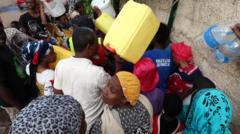As the remnants of Cyclone Chido sweep through Mayotte, the stark reality of devastation is laid bare across the landscape of this French territory in the Indian Ocean. Journalists, including Mayeni Jones from the BBC, describe a scene where lush rolling hills formerly abundant with coconut trees have been turned into a barren wasteland. The intensity of the cyclone, with winds exceeding 220 km/h, has transformed the island, toppling trees and damaging critical infrastructure, including the airport's communication tower.
French authorities report at least 31 fatalities, with concerns that the death toll may rise as thousands remain unaccounted for. The cyclone has triggered a formal declaration of a natural disaster in Mayotte, already marked as one of France’s poorest regions, with many of its residents living in informal settlements. The extreme weather event has compounded existing difficulties, fueling humanitarian crises as a significant portion of the population is left without access to clean water, food, or shelter.
President Emmanuel Macron's visit to the island on Thursday, which included the delivery of essential supplies, brought additional scrutiny. Some critics argue that the devastation reflects long-standing neglect and underinvestment by the French government, indexing a broader conversation about political priorities in overseas territories. As Macron faces internal political challenges, including contentious immigration debates that touch on the migrant population in Mayotte, the storm's aftermath has intensified discussions about how to support the island without incentivizing further migration.
Currently, the government has declared a state of emergency for Mayotte, aimed at expediting recovery efforts by bypassing administrative hurdles. Emergency services are mobilized to restore vital services, clear debris, and locate the missing. However, health officials warn of potential outbreaks of infectious diseases due to shortages of potable water and rationing in stores. An imposed curfew aims to maintain order amid the chaos, as half of the territory remains without power.
Cyclone Chido is considered the most severe natural disaster to strike Mayotte in nearly a century, with its destructive path extending beyond the island to the African mainland, where it has claimed additional lives in Mozambique and Malawi. The future of Mayotte remains uncertain, as recovery efforts continue amidst pressing political and social challenges.




















